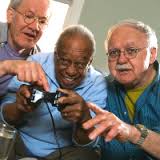Jennifer McGrath, L.Ac., Dipl.OM from Points of Wellness in Oakbrokk Terrace, IL shared that aging may be inevitable, but your later years can be vibrant and healthy if attention is given to supporting your physical, mental and emotional well-being. These tips are just a few of the ways that you can bring balance into your life. You don’t need to try doing all of them at once. Focus on one or two of them.
Practice Gratitude
Grateful people report higher levels of positive emotions, life satisfaction, vitality, and optimism, and lower levels of depression and stress, according to Robert A. Emmons, a researcher and professor at University of California-Davis who has authored four books on the subject of the psychology of gratitude.
Dr. Emmons states that the disposition toward gratitude appears to enhance pleasant feeling states more than it diminishes unpleasant emotions. Grateful people do not deny or ignore the negative aspects of life, but they have a healthy attitude towards them.
Make Exercise a Priority
People who exercise more are less likely to be stressed and more likely to be satisfied with life, according to Danish researchers. Compared with sedentary people, joggers are 70 percent less likely to have high stress levels and life dissatisfaction.
Qi Gong and Tai Chi are non-impact exercises that focus on repetitive movements with attention to breathing. Tai Chi and Qi Gong use gentle movements and low physical impact, which are ideal for aging bodies.
The benefits of these exercises include a slower heart rate, lowered blood pressure, and drops in adrenaline and cortisol levels. Making these exercises a regular practice can lead to better health and vitality. The Mayo Clinic reported results from two studies on these ancient practices that concluded they can also alleviate chronic pain.
Take a Day of Rest
Take a day of rest per week from your regular schedule to recharge. Rejuvenation for the body and mind is worth its weight in gold and you will be more productive with the rest of your time!
Get Good Sleep Regularly
Your body repairs itself best at night, so allow plenty of time for it to do so. Good sleep patterns follow nature. Morning is bright and the most Yang time of day, indicating activity. Night is the dark period, a time to slow down and enter the Yin phase of the day.
Poor sleep has been linked to high blood pressure, atherosclerosis, heart failure, heart attacks, stroke, diabetes and obesity. Research has shown that getting at least eight hours of sleep is needed for good heart health.
Alleviate and Manage Stress Levels
Stress is a normal part of life, but if left unmanaged, stress can lead to emotional, psychological, and even physical problems, including heart disease, high blood pressure, chest pains or an irregular heartbeat. Numerous studies have demonstrated the substantial benefits of acupuncture in the treatment of stress, anxiety and mental health.
In addition to acupuncture, Oriental medicine offers a whole gamut of tools and techniques that can be integrated into your life to keep stress in check. These tools include Tui Na, Qi Gong exercises, herbal medicine, dietary therapy, meditations and acupressure that you can administer at home.
Address Health Concerns Quickly: Don’t Wait!
Many diseases can be cured easily if they are caught early, but people often put off seeking treatment. They ignore important signals that something is wrong with their body. We all get warnings about our health and well-being, but these warnings are like traffic lights. They tell us what we ought to do, but they cannot make us do it.

 Danica Patrick for Edwards-Elmhurst Hospital shared that it’s impossible to walk away from an event where you’ve helped somebody (especially if it involves kids) feeling angry or bitter.
Danica Patrick for Edwards-Elmhurst Hospital shared that it’s impossible to walk away from an event where you’ve helped somebody (especially if it involves kids) feeling angry or bitter. Senior Helpers shared in the Daily Herald Newspaper that when family members get together for the holidays, they may realize that things aren’t the same as they used to be with their elderly relatives.
Senior Helpers shared in the Daily Herald Newspaper that when family members get together for the holidays, they may realize that things aren’t the same as they used to be with their elderly relatives.


